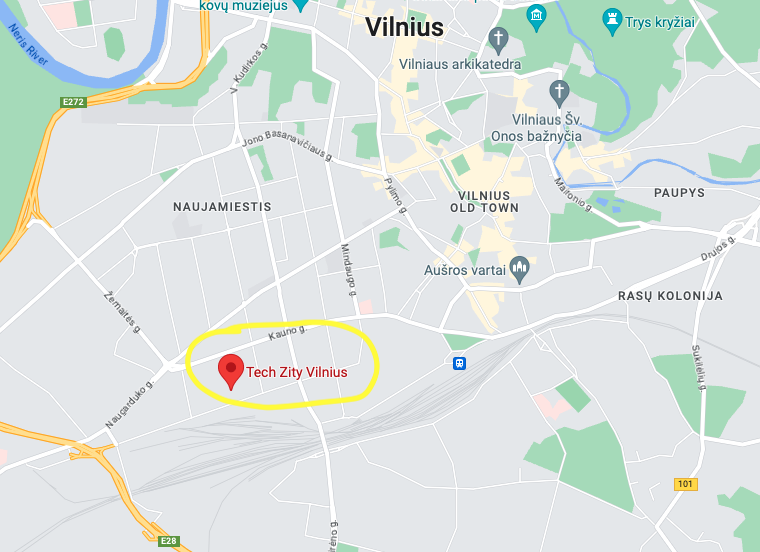Lithuania is vying to become one of the major European tech hubs, bolstered by a growing number of so-called “unicorn” startups and governmental efforts to attract a high-profile accelerator to the country. At the same time, a new €100 million private initiative announced today is setting out to create what would be Europe’s largest tech campus, situated in the heart of Lithuania’s capital Vilnius.
Building on the site of an old Soviet-era sewing factory in the city’s New Town, Tech Zity, as the project is called, is touted to open in 2024 with office space for 5,000 workers, auditoriums for meetings and events, and more. In addition, a core selling point will be its focus on hybrid working, with a 24/7 ethos supported by co-living spaces, restaurants and bars for out-of-work socializing.
At 55,000 square metres (592,015 square feet), Tech Zity would be nearly two-thirds bigger than Station F in Paris, which opened back in 2017.
Zity slickers
Lithuania doesn’t always fall on the mainstream tech startup radar, but there has been some notable activity there these past few years. Second-hand clothes marketplace Vinted, for example, hit unicorn status back in 2019, going on to raise some $562 million at a $4.5 billion valuation with notable backers including Accel, Insight Partners and Lightspeed Venture Partners.
Then there’s Nord Security of NordVPN fame, which hit a $1.6 billion valuation last year off the back of its first institutional fundraise from the likes of private equity firm Novator, VC firm General Catalyst and WordPress co-creator Matt Mullenweg. Elsewhere, fledgling Vilnius-based fintech Kevin scooped a $65 million Series A last year from big-name backers including Accel.
To capitalize on this, Lithuania’s Ministry of the Economy and Innovation announced a €13 million open tender back in March to attract an “internationally acclaimed startup accelerator” to the country. So now would seem as good a time as any for the private realm to take up the mantle and build what Tech Zity touts as an “infrastructure first” campus replete with all the amenities a tech company might need.
The Tech Zity project’s funding hails from several sources. Of the planned €100 million fund required to fulfil the project, some €30 million has been committed so far, with Vinted co-founder and chief operating officer Mantas Mikuckas contributing around 80% of the initial tranche and Tech Zity founder Darius Žakaitis making up the remainder. This “primary” phase has involved buying the land and buildings, and laying the groundwork for the reconstruction required to transform the site. For the next phase, Tech Zity is looking to secure the additional €70 million from various sources, including banks and private investors.
“Our main goal is to foster the startup community,” Žakaitis explained to TechCrunch. “Currently, this community is scattered in different locations. Startups and tech companies highly value the opportunity to be together, exchange knowledge and experience. Most of them go through similar stages, face similar challenges and problems, such as growth hacking and bootstrapping with limited budgets, entering larger markets, leveraging AI capabilities, attracting investments and developing funds and more. The best answers to these questions can come from those who have already walked this path and have built successful startups.”
It’s worth noting that the “Tech Zity” brand already exists, as it is the name of the overarching real estate company behind the project which has already launched four smaller hubs across the Lithuanian capital and surrounding area. These include Tech Park, which was converted from an old hospital back in 2016 and is now home to a number of businesses, including Google’s main regional hub; Tech Loft, which is primarily targeted at seed-stage startups; Tech Arts, a hybrid co-working and events space; and Tech Spa, a work-resort crossover about an hour away from Vilnius.
Collectively, Tech Zity’s four existing locations amount to some 20,000 square meters, meaning that with its eponymous flagship campus opening next year, Tech Zity’s sprawling footprint will hit the 75,000-square-meters mark across the region.
A “Lithuanian Silicon Valley”
The Tech Zity Vilnius site is located less than two miles from the city center, and just a 10-minute walk from Vinted’s HQ and Nord Security, which recently moved into its new HQ in the new Cyber City complex. At first glance, the two initiatives seem fairly similar; however, Cyber City appears to be centred largely around companies affiliated with Lithuanian incubator and accelerator Tesonet, which helped birth the likes of Nord and Surfshark, which merged last year, as well as startups such as Oxylabs and CyberCare.
“We are not competing,” Žakaitis said. “On the contrary, we will collaborate to make this part of Vilnius a kind of Lithuanian Silicon Valley.”


Tech Zity will be built on an old industrial site spread across three adjacent streets.

One of the main goals during the conversion is to upcycle much of the original materials at the site, including adapting old sewing machine parts for chairs and phone booths, and repurposing old ventilation systems for boardroom tables and kitting out new kitchens.


As for living spaces, well, the current plan for Tech Zity Vilnius is to build 70 to 80 co-living loft spaces above the offices.
“These lofts will be designed for both short-term and long-term rentals, as we see the demand for such accommodation,” Žakaitis said. “They will not only serve the needs of companies operating within the project who receive guests, but also contribute to the project’s vitality 24/7. Additionally, we also plan to provide various services for employees and residents, such as a sports club, beauty services, restaurants and more.”
While startups will be a major target market for Tech Zity, it’s ultimately aimed at everyone from individual freelancers who can work from cafes or other shared working spaces, to companies ranging from five to 300 employees.
“We estimate that there are currently 18,000 employees working in Lithuania’s startup ecosystem,” Žakaitis said. “We aim to have a diverse audience that fosters connections within Lithuania’s startup ecosystem and drives the creation of new products. We are also open to and engaged in discussions not only with local companies but also with international companies interested in establishing a presence in Vilnius through the Invest Lithuania program or invited by the Bank of Lithuania, particularly in fintech.”































Comment